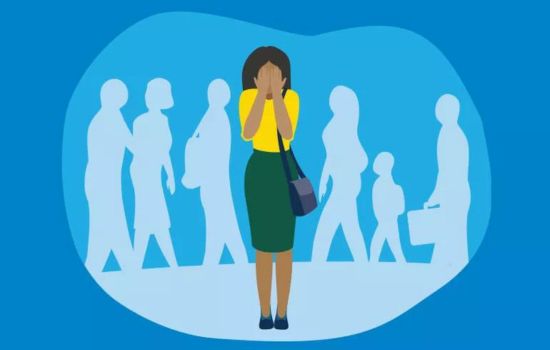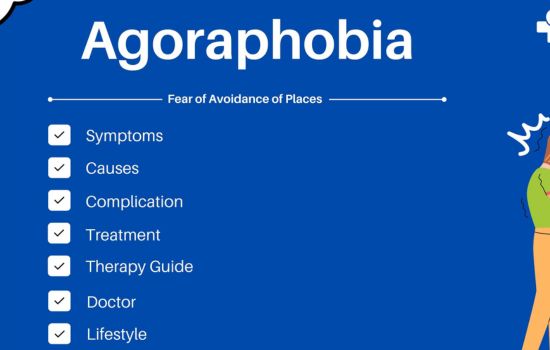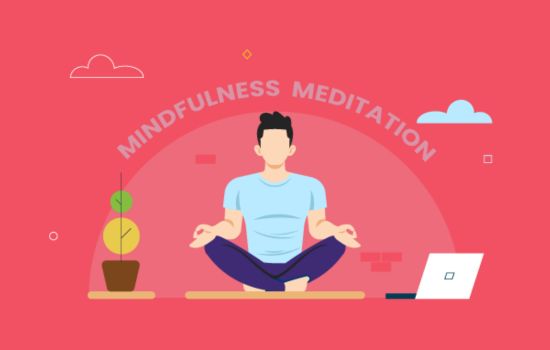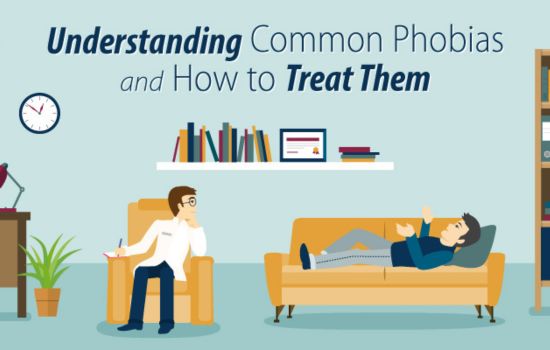A form of anxiety disorder known as a phobia is defined as an overwhelming and illogical fear of particular things, circumstances, or activities. They might be anything from more uncommon ones like the fear of buttons or mirrors to more familiar ones like the fear of heights or spiders. A person’s quality of life can be greatly impacted by phobias, thus it’s important to recognize the different kinds of phobias and look into management techniques.
Table of Contents
Types of Phobias
Specific phobias: These are characterized by a strong fear of a certain thing or circumstance. Popular particular phobias of:
Arachnophobia: Spider phobia, or arachnophobia.
Acrophobia: is the terror of heights.
Claustrophobia: is the fear of small areas.
Aviophobia: The fear of flying
Ophidiophobia: Snake phobia.
Social Phobia (Social Anxiety Disorder):
This is a severe fear of being scrutinized, judged, or embarrassed by others in a social setting. Meeting new people, attending social events, and giving public speeches are common scenarios that set off social anxiety.

Agoraphobia:
Agoraphobia is the fear of places where it may be impossible to flee or where there is no one to turn to for assistance in the case of a panic attack. This can apply to crowded areas, wide-open areas, or solitary outdoor areas. Panic disorder frequently coexists with agoraphobia.

10 Tips for Reducing Phobias:
Although controlling phobias might be difficult, their effects can be lessened with the appropriate techniques. These are ten practical strategies for overcoming phobias:
1. Recognize Your Phobia:
Power comes from knowledge. Discover more about your particular phobia to comprehend its causes and effects. It may be simpler to confront and control your fear if you know its underlying causes.
2. Therapy with Gradual Exposure:
Desensitization, also known as gradual exposure, is exposing yourself to the thing or circumstance you are afraid of gradually and frequently. Begin with less daunting elements and progress progressively. With time, anxiety can be reduced by using this technique to assist your body and mind adjusts to the fear stimuli.
3. Practice Mindfulness and Relaxation Techniques:
Deep breathing, meditation, and progressive muscle relaxation are examples of mindfulness practices that can help you relax mentally and lessen the physical signs of worry. Stress brought on by phobias can be more easily managed with regular practice.

4. Cognitive Behavioral Therapy (CBT):
CBT is a very powerful type of treatment that assists you in recognizing and confronting the harmful thought patterns connected to your phobia. By working with a professional therapist, you can learn more constructive methods to process and deal with fear.
5. Medication:
Medication may occasionally be required to treat severe phobias. Beta-blockers, antidepressants, and anxiety medications can all help lessen the symptoms. You should always speak with a medical expert to find out if taking medicine is right for you.
6. Build a Support System:
It can really help to have a network of friends, family, or a support group behind you. Talking to people who understand your anxieties can help you feel less alone and more encouraged.
7. Challenge Negative Thoughts:
Irrational anxieties and pessimistic thoughts are frequent features of phobias. Develop the ability to recognize and confront these unfavorable ideas. Is this fear based in reality? What could possibly go wrong? How probable is it to happen?
8. Stay Active and Healthy:
Frequent exercise can elevate your mood and lower anxiety. Endorphins are naturally occurring hormones that are released during exercise. You may also control your anxiety levels by eating a balanced diet and getting enough sleep.
9. Set Realistic Goals:
A phobia takes time to get over. No matter how modest the change may seem, acknowledge your progress by setting small, attainable goals. Every step you take toward conquering your fear is a win.
10. Seek Professional Help:
It’s imperative to get expert assistance if your fear is seriously interfering with your day-to-day activities. Licensed therapists, psychiatrists, and psychologists can provide customized therapies based on your needs.
Conclusion:
Although frightening, phobias can be controlled with the appropriate strategy. You may lessen the hold that fear has over your life by being aware of the many kinds of phobias, using techniques like progressive exposure, mindfulness, cognitive behavioral therapy, and getting professional assistance. Never forget that conquering a fear is a journey, and every step you take is a step closer to your goal. You may take back control and live a more satisfying life if you are persistent and receive support.

